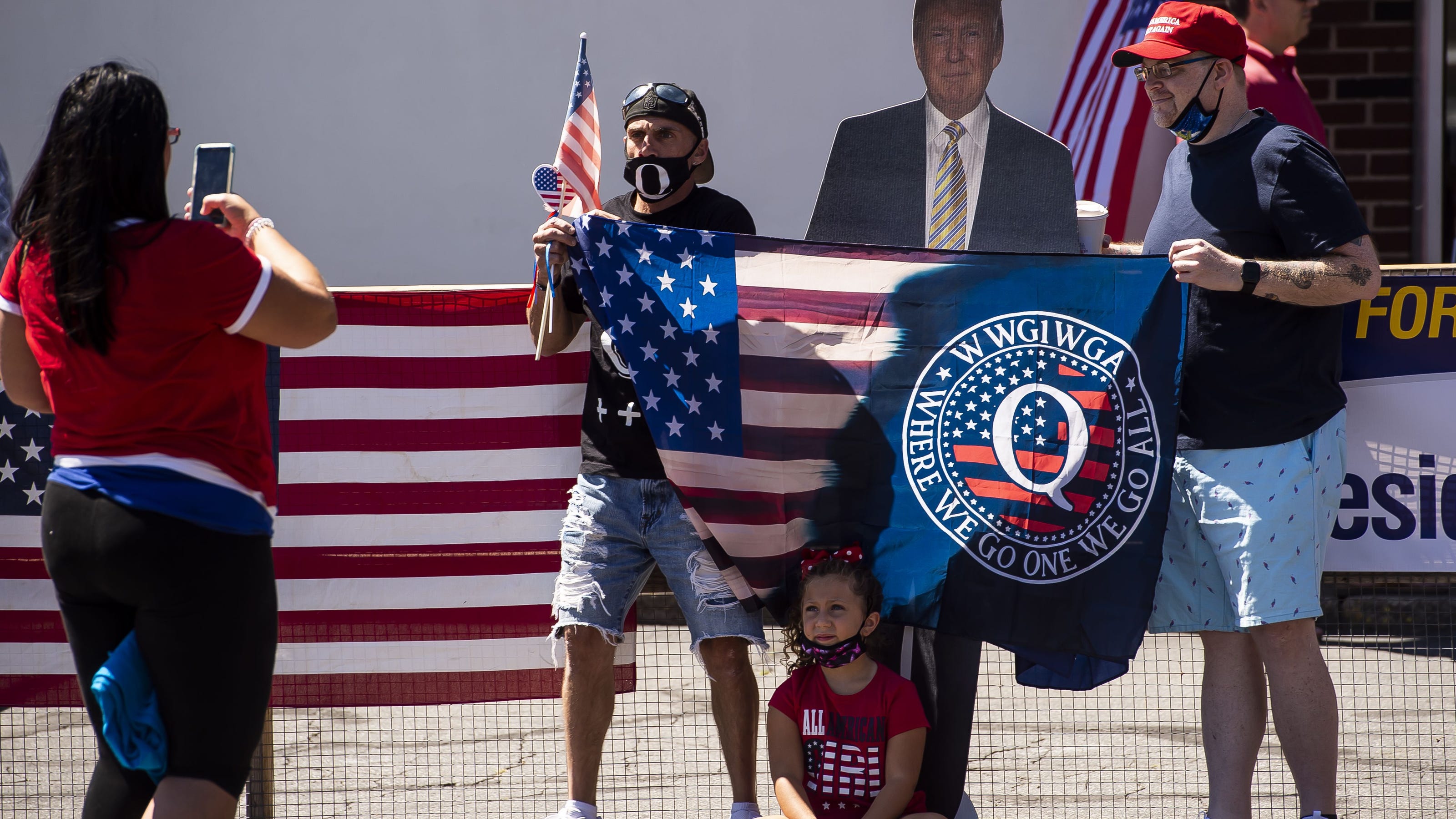What is QAnon, the far-right conspiracy theory causing controversy at the RNC?

QAnon, a debunked, right-wing conspiracy theory once on the political fringes, has seeped into the political landscape and into this week’s Republican National Convention.
The same day a bipartisan pair of lawmakers introduced legislation condemning the conspiracy theory, a speaker was removed from the RNC lineup for retweeting posts linked to QAnon.
Here’s what QAnon is and why it is causing controversy this week.
What is it?
The QAnon conspiracy theory, which the FBI has called a domestic terrorism threat, is based on unfounded claims that there is a “deep state” apparatus run by political elites, business leaders and Hollywood celebrities who are also pedophiles and actively working against President Donald Trump.
It includes the belief that Trump is secretly saving the world from a satanic cult of pedophiles and cannibals and has been linked to some violent crimes across the country.
More:RNC speaker pulled from lineup after boosting QAnon-tied conspiracy about Jewish people
More:Trump says QAnon conspiracy theorists ‘like me very much’ and ‘love our country’
How has it come up at the RNC?
QAnon also caused controversy during the Republican National Convention.
Tuesday, Mary Ann Mendoza, an RNC speaker, was removed from the night’s lineup after earlier retweeting anti-Semitic posts tied to the conspiracy theory. After her removal, she apologized in a later post for “not paying attention to the intent of the whole message.”
Marjorie Taylor Greene, a Georgia congressional candidate tied to the theory, tweeted Tuesday that she would be attending Trump’s RNC speech in person Thursday.
“I’m honored and thrilled to be invited to attend President Trump’s acceptance speech Thursday evening at the White House,” she tweeted Tuesday. “I’m also equally excited to vote for him again November 3rd, and I’m working hard all over Georgia to help him win.”
What candidates have been linked to it?
Despite criticism, several QAnon-linked candidates have won Republican primaries this year. Progressive watchdog group Media Matters for America counts at least 19 Republican congressional candidates linked to QAnon, and several are likely to be elected to Congress in the November elections.
Greene is likely to win the general election in her deep-red district in northwestern Georgia. Trump called her a “future Republican Star” in a tweet after her primary win, though White House Press Secretary Kayleigh McEnany told reporters Trump had not “done a deep dive into the statements” of Greene.
Another QAnon-linked candidate, Lauren Boebert, beat incumbent Rep. Scott Tipton for the Republican primary in Colorado’s 3rd Congressional District earlier this year. Boebert is also favored to win the general election in the district.
Both Greene and Boebert have tried to distance themselves from their previous connections to the conspiracy theories.
Greene told Fox News QAnon “doesn’t represent me” and that she was just “looking at other information” online,” and Boebert told local TV station Fox 31 Denver she was “not a follower.”
“QAnon is a lot of things to different people,” Boebert said. “I was very vague in what I said before. I’m not into conspiracies. I’m into freedom and the Constitution of the United States of America. I’m not a follower.”
More:Lawmakers introduce bipartisan measure condemning right-wing conspiracy theory QAnon
Colorado Republican Party spokesperson Joe Jackson said Boebert and her campaign “have repeatedly disavowed QAnon and said that she is not a follower, doesn’t believe it, and does not believe in conspiracy theories.”
What has Trump said?
Trump said at a press briefing on Aug. 19 that he did not know much about QAnon other than that “they like me very much, which I appreciate.”
“These are people that don’t like seeing what’s going on in places like Portland, Chicago and New York and other cities and states,” he told reporters. “I’ve heard these are people that love our country.”
When a reporter further explained the theory to Trump, including the belief that Trump is secretly saving the world from a satanic cult of pedophiles and cannibals, Trump responded: “Is that supposed to be a bad thing? If I can help save the world from problems I’m willing to do it, I’m willing to put myself out there.”
McEnany said earlier on Aug. 19 she had “never heard of that (support for QAnon) from the president.”
Media Matters for America says Trump has retweeted Q-linked accounts at least 216 times.
Who has condemned it?
Political leaders on both sides of the aisle have condemned the conspiracy theory.
Vice President Mike Pence said on CNN’s “New Day” last Friday QAnon was a “conspiracy theory” to be dismissed “out of hand.”
And House Minority Leader Kevin McCarthy, R-Calif., told Fox News last week, “There is no place for QAnon in the Republican Party.”
Rep. Tom Malinowski, D-N.J., and Rep. Denver Riggelman, R-Va., introduced legislation Tuesday that would condemn the theories.
“It’s time for us to come together across party lines to say that QAnon has no place in our nation’s political discourse,” Malinowski said.
The measure would condemn QAnon; ask federal law enforcement agencies to remain vigilant against violence provoked by conspiracy theories; and urge Americans to get information from trustworthy sources. The measure must first pass the House Judiciary Committee before it can be considered by the full House of Representatives.
Facebook took action last week to ban hundreds of groups linked to QAnon, though it did not outright ban QAnon content from the site, and Twitter has banned thousands of accounts linked to QAnon.
Contributing: Courtney Subramanian, Savannah Behrmann
More:Facebook bans more than 790 groups tied to QAnon, plus more than 980 militia-linked groups
*** This article has been archived for your research. The original version from USA TODAY can be found here ***

